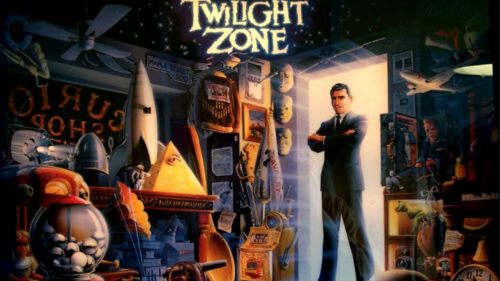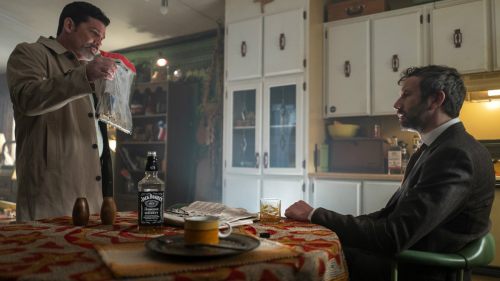Looking Back At Rod Serling And THE TWILIGHT ZONE
I’ve had a New Year’s Day tradition with my father (done less now that I live across the country) where we watch a Twilight Zone marathon. It has always been one of my most anticipated holiday traditions. (And probably one of the many reasons I’m often referred to as “grandfatherly” by my friends.) As a kid, I loved to watch this old black and white show with spacemen and monsters and “that guy from T.J. Hooker”, but as I grew up, I began to notice the messages and layers built into each episode. At the helm of this rocket ship into “a dimension not only of sight and sound but of mind” was Rodman “Rod” Serling.
A rarity in modern television, the science fiction anthology series is making a comeback. Black Mirror revived the genre in recent years and now it is particularly regaining life in the form of a remake of The Twilight Zone by Jordan Peele himself. Rod Serling wrote the book when it came to sci-fi anthologies. The original Twilight Zone was sometimes funny, sometimes scary, sometimes bleak, but at all times a reflection of society and an allegorical look at the world around us. His vivid writing was no doubt influenced by his early propensity for radio plays (the popular horror series Lights Out was an early fave of his), which had to paint a picture with words. Once he was given the luxury of a television screen, his imagination was allowed to fly unfettered.
Born in Syracuse, New York, in 1924, Serling was naturally drawn to writing and performing. His family, mostly supportive of his talents, encouraged him to put on plays with the neighborhood children, even building him a stage in the basement. While Serling had a good relationship with his own parents, the sanctity of childhood was an oft-visited theme in the Twilight Zone. The last episode of the series, “The Bewitchin’ Pool”, dealt with the (at the time) scandalous increase of divorces in post-World War II America and its effect on children. An affluent family who has everything except warmth and affection for their kids, the Sharewood parents announce to their children that they are getting a divorce. Worse yet, the children need to decide who they plan to live with. (Fun fact: one of the children is played by Mary Badham, aka Scout Finch from To Kill a Mockingbird, who really cornered the market on playing children with shattered innocence.) The episode flashes back to earlier that day, when the children are beckoned to swim through their pool floor and enter an oasis of a swimming hole, where neglected children find paradise with a kind elderly woman they call Aunt T. They feel guilt at leaving their parents so they return home only to be told about the impending divorce. Realizing Aunt T is their only chance at happiness, they go back through the pool, disappearing before their parents’ eyes.
As high school came to a close and World War II was at its climax, Serling felt the call to enlist and defeat the Axis powers. He was sent to the Pacific front and fought in the 511th Parachute Infantry Regiment. Many episodes of The Twilight Zone dealt with soldiers and the military. Perhaps most well-known is the first episode of the series “Where Is Everybody?” As the episode begins, an Air Force pilot walks down a dirt road and comes to the Main Street of a town which has apparently been deserted just moments before his arrival. A cigar still smolders in an ashtray; a pot still boils on a stove. Still the pilot can’t find anyone. He’s “home”, but he’s detached and not a part of it. As he continues to explore, his concern grows to panic until finally he runs into the streets and screams out for help, manically pushing the “walk” button at an intersection. The scene then changes to show this same pilot mashing a “panic” button in an isolation chamber. The whole town was nothing but a hallucination, brought on by the pilot’s isolation. Even though he was given all the food, water and oxygen he needed to survive, it wasn’t enough and the connection of human companionship was what he ultimately craved.
While overseas, Serling witnessed death and destruction, the multitude and magnitude of which he wasn’t prepared for, and in later interviews, commented that this was a reason the theme of death was prevalent in so much of his work. The episode “One For The Angels” deals with Lou Bookman, a salesman who is greeted on the street one day by Death itself. He denies Death, he shuns him, he even bargains with him, but in the end, he accepts his fate and leaves with him.
Serling suffered from nightmares from his war experience his entire life. Much of his work in the army was with a specialized demolitions troop within his regiment called the Death Squad, so named due to the extreme casualty rate of the squad's soldiers. Serling saw his fellow soldiers, enemy soldiers and even civilians killed during his tour and it deeply affected him. One of the most well-known episodes of TheTwilight Zone is “Nightmare at 20,000 Feet” which dealt with the theme of mental trauma. It starred a young William Shatner as Mr. Wilson, embarking on a plane ride home after a time in a sanitarium to deal with a nervous breakdown. Seated by the window, as the flight progresses, Wilson begins to see a strange figure on the wing of the plane. Each time he tries to bring it to someone’s attention, it disappears, making him appear to have imagined it. The creature begins to tamper with the plane, causing Wilson’s fear and anxiety to grow, exacerbated all the more by the fact that no one believes him. This finally culminates in him jumping from his seat in a panic, having (to everyone else) gone completely insane. Escorted off the plane strapped to a stretcher, Mr. Wilson takes one last look at the wing of the plane, which we can now see has claw marks and damage, making him (and the rest of us) certain that what he saw was real.
Having been discharged from the Army with a Bronze Star and Purple Heart, among many other such awards, Serling enrolled in college and began to study radio broadcasting, taking any job he could get writing at stations from Cleveland to New York, eventually making the transition to writing for television. He would write his own spec scripts all night while holding down various jobs writing radio and television copy for everything from soap opera-like dramas to vacuum commercials.
Finally getting enough success, he moved his family to New York to find more work. He cut his teeth on drama anthologies, influencing his storytelling style away from a series-long arc with the same characters. Critics began to notice and he moved his family across the country to Los Angeles to be closer to the new media of television. Always wanting to have more of a message in his work than just cops and robbers or romance, he infused political and moral messages into his material. This was often met with resistance from censors, who in a mid-‘50s “don’t rock the boat” political environment, didn’t want to broadcast shows about the horrors of war to America’s families.
Serling eventually realized he could mask the messages he wanted to send in the form of science fiction and allegory. On the success of his earlier work, he got the concept for the Twilight Zone greenlit and thus began the hallmark series of his career. The show (and even its ‘80s remake) was a hotbed for some of the best science fiction and horror’s best creators. Ray Bradbury wrote an episode for Serling, and Superman helmer Richard Donner, directed several early episodes. (Fun tangential fact: Wes Craven was a director for several episodes of the ‘80s version of the series and makes an appearance in a personal favorite episode, “Children’s Zoo”.)
As his fame grew, Serling utilized his influence to support causes dear to him, namely the anti-war efforts of the Vietnam era and fighting against anti-Semitism and racism through his post-Twilight Zone work and his personal interviews.
After his death from a heart attack in 1975 at the relatively young age of 50, Serling’s daughter Anne has worked to preserve his legacy, including writing an autobiography full of stories about her father and maintaining a very cool Twitter feed with anecdotes and quotes from her father, including a particularly scathing tweet during the recent Kavanaugh hearings. I saw this tweet and it made me think if Serling had been alive for Twitter, I don’t doubt he’d have been pleased by using it to serve this message. I, personally, also would’ve paid anything to see him write an episode of The Twilight Zone all about how Twitter is the downfall of civilization.



